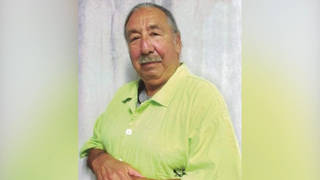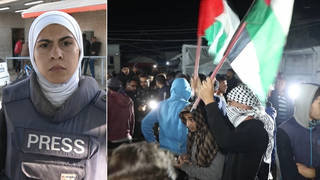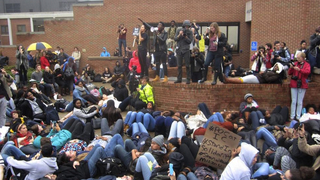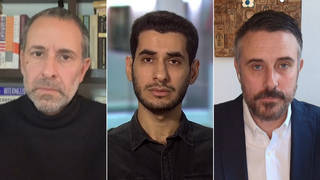
Related
Guests
- Danielle Walkermaster’s student at the Truman School of Public Affairs at University of Missouri and creator of the Racism Lives Here movement at the school. She is also a graduate research assistant for the Chancellor’s Diversity Initiative and graduate research assistant in the Department of Educational Leadership & Policy Analysis.
- Stephanie Shonekanchair of the Department of Black Studies at the University of Missouri and an associate professor of ethnomusicology.
A revolt by African-American students at the University of Missouri has forced two top officials to resign. On Monday, President Tim Wolfe and Columbia campus chancellor R. Bowen Loftin announced they will step down in the face of protests over their handling of racism on campus. African-American students have staged weeks of demonstrations against what they called a lax response to bigotry and vandalism. In a key moment Saturday, African-American football players joined the protest, vowing to boycott games and other team activities until Wolfe resigned. We are joined by Mizzou student Danielle Walker, who has organized “Racism Lives Here” demonstrations on campus; and University of Missouri Black Studies Chair Stephanie Shonekan. “[Racist] incidents just seem to be almost a rite of passage for black students when they enter the University of Missouri,” Walker says. “I think it is atrocious that these protests had to get to this point in order to truly bring about change, that a student was willing to give their life in order to bring the necessary attention [to] what we have been experiencing so long at this university.”
Transcript
AMY GOODMAN: A revolt by African-American students at the University of Missouri has forced two top officials to resign. On Monday, President Tim Wolfe said he is quitting, and Columbia campus Chancellor R. Bowen Loftin announced he will be stepping down by the end of the year, in the face of protests over their handling of racism on campus. African-American students have staged weeks of demonstrations against what they call a lax response to bigotry and vandalism. For a week, an African-American graduate student named Jonathan Butler staged a hunger strike that he said would only end with Wolfe’s resignation. Students set up a campus encampment in support of Butler’s action. They’ve dubbed themselves Concerned Student 1950, a reference to the year the school’s first black student enrolled. The administration has also faced opposition from graduate students who fought to win back their health coverage and activists who denounced a move to sever ties with Planned Parenthood under Republican pressure.
A turning point came on Saturday when African-American players on the University of Missouri’s football team joined the protest. In a tweet quoting Dr. Martin Luther King Jr., the players wrote, “The athletes of color on the University of Missouri football team truly believe 'Injustice Anywhere is a threat to Justice Everywhere.'” They announced they would no longer take part in any football activities until President Wolfe resigned or was removed, quote, “due to his negligence toward marginalized students’ experience,” unquote. The coach and athletic department soon came out in support of the team. The pressure on Wolfe then snowballed. The following day, members of the “Concerned Faculty” group at the University of Missouri voted to stage a walkout, and the Missouri Students Association, representing 27,000 undergraduates, called on Wolfe to resign.
On Sunday night, Wolfe was still defiant, vowing to stay on. But in a shocking turn of events Monday, Wolfe held a news conference to announce his departure.
TIM WOLFE: I’m resigning as president of the University of Missouri system. My motivation in making this decision comes from love. I love MU, Columbia, where I grew up, the state of Missouri. I have thought and prayed about this decision. It’s the right thing to do.
The response to this announcement I’m sure ranges from joy for some to anger to others, and that’s why we’re here today. So let me speak to why this is so important at this time. To our students, from Concerned Students 1950 to our grad students, football players and other students, the frustration and anger that I see is clear, real, and I don’t doubt it for a second. …
I’d ask everybody, from students to faculty to staff, to my friends, everybody, use my resignation to heal and start talking again, to make the changes necessary, and let’s focus on changing what we can change today and in the future.
AMY GOODMAN: That was University of Missouri President Tim Wolfe announcing his resignation. His move came just before the school’s governing body, the Board of Curators, was set to discuss his future. The resignation of Columbia campus Chancellor R. Bowen Loftin came just hours later. His departure takes effect in January, but he will stay working at the university. Students gathered on campus to celebrate their victory, and activist Jonathan Butler announced his hunger strike was over. Addressing supporters, Butler wore a T-shirt that said, quote, “I Love My Blackness and Yours.”
JONATHAN BUTLER: Please stop focusing on the fact of the Mizzou hunger strike itself. Look at why did we have to get here in the first place and why the struggle and why we had to fight the way that we did. …
At the end of all this, after all the letters we’ve sent, all the in-person interactions, after all the forums we’ve attended, after all the tweets and DMs that we’ve sent, telling the administration about our pain, it should not have taken this much. And it is disgusting and vile that we find ourselves in the place that we do. …
So with that in mind, I give, one, all glory to God for even allowing me to still stand in this moment. And two, I want to acknowledge that this was—this was not—that it was not me alone. It was these people that I’m standing on here the stage with. It was the black community. It was the black faculty. It was the other faculty. It was the Forum on Graduate Rights. It was the people with Planned Parenthood. It was everybody who chose to stand up in this time who made this possible. This was not Jonathan Butler. This was the Mizzou community, for one of the first times that I’ve ever seen, stand together united.
AMY GOODMAN: That was hunger-striking University of Missouri graduate student Jonathan Butler, speaking just after the resignation of University of Missouri President Tim Wolfe.
For more, we’re joined by three guests. Dave Zirin is with us in Washington, sports columnist for The Nation magazine. His latest article, “3 Lessons from University of Missouri President Tim Wolfe’s Resignation.” Danielle Walker joins us. She’s a master’s student at the Truman School of Public Affairs at the University of Missouri in Columbia and creator of the Racism Lives Here movement at Mizzou. Stephanie Shonekan is with us, as well. She’s chair of Black Studies at the University of Missouri, associate professor of ethnomusicology and black studies.
We welcome you all to Democracy Now! Let’s begin with Danielle. Danielle, can you first respond to the resignation of the University of Missouri President Tim Wolfe, as well as your campus chancellor, Loftin, who will leave his chancellorship at the end of the year?
DANIELLE WALKER: Yes. I think it’s important to highlight how leadership has to be held accountable. When Tim Wolfe says that, you know, he loves MU, how can you say that you love MU or that you loved MU when you’ve had students of color suffering so long underneath your leadership role? And so, it’s very bittersweet to see all these changes going on in our university, but also understand that this is long overdue, and it is time for new leadership to take over the reins and to assure that they are going to steer now the University of Missouri onto a course that is about diversity, inclusion and a welcoming environment for all students.
AMY GOODMAN: Danielle Walker, can you take us through what took place on your campus, why you created the Racism Lives Here movement? I think, for a lot of people, they heard for the first time what was going on at the university yesterday, when the president announced he was resigning. But you have been dealing with this for a very long time. Explain what led to this point.
DANIELLE WALKER: Yes. I’ve been a student of the University of Missouri since 2008. My sophomore year, we had the cotton ball incident, where white students sprayed cotton balls all over our Black Culture Center. And our administration’s response was that they committed littering and vandalism, not that it was a hate crime. That inaction, from there on all the way ’til now, has just been building upon itself.
And this fall, our student body president, Payton Head, was called the N-word while walking on campus, which is a common occurrence for black students. It’s almost normalized and expected that if you are walking on campus at nighttime and black, be prepared to be called the N-word. And I was absolutely outraged and disgusted that, once again, the administration, who I had hoped that when our body president was called this, that they will respond more alert to this, and they didn’t.
AMY GOODMAN: I wanted to—
DANIELLE WALKER: It wasn’t until I held a rally that I—
AMY GOODMAN: Let me go to Payton Head, the president of the Missouri Students Association. Head recently told The New York Times there’s not enough discussion about the history of systemic oppression at the University of Missouri.
PAYTON HEAD: The University of Missouri was founded in 1839 as the first public land-grant institution west of the Mississippi River. Who was building buildings in 1839? Slavery wasn’t abolished until 1865. But we don’t talk about that history here at the University of Missouri. Who built this campus? Who built the library that’s celebrating its centennial this year? Mr. Brady, you know, was—for Brady Commons, which was the name of the MU student center, you know, he fought to make sure that LGBTQ students could not meet on this campus. They went to the Supreme Court. That’s the reason why LGBTQ students can meet on campuses around the nation. But that was the name of our student center. So that’s the systematic oppression that I’m talking about.
AMY GOODMAN: That’s Payton Head, the university student president. Danielle Walker, if you could continue with the treatment of African-American students on campus that led to this?
DANIELLE WALKER: Yeah, once again, all these incidents just seem to be almost—almost a rite of passage for black students, of when they enter into the University of Missouri, that they are going to be faced with this hostile racial climate, the lack of sensitivity from their professors when they’re trying to have—you know, engage in dialogue in classes, when their classmates are invalidating their experiences. I think it’s atrocious that all these protests and movements had to get to this point in order to truly bring about change, that a student was willing to give their life in order to bring the necessary attention of what we’ve been experiencing so long at this university, with Concern Student 1950, once again, articulating this complex history at the university. There are so many tours that goes on on our campus, and the history is still being denied, and I think that’s why it’s important for Payton Head to shed light on what has been occurring at our campus, and why racism, when I said it lives here—because it does, it lives in our history, it’s embedded in our traditions and our legacy. But there has never been any formal acknowledgment of this history and how that continues to perpetuate these acts of hate.
AMY GOODMAN: Can you talk about one of the latest incidents of a swastika?
DANIELLE WALKER: Once again, I was deeply disturbed that the only way I was able to find out that this incident occurred on my campus was through Twitter and that someone tweeted about it. There was no information from officials on our campus or administrators that released any kind of information from students. It actually—when the tweet happened, it was already a few days past the event. So this is what I am referring to of why I had to start this movement—
AMY GOODMAN: And what was—what actually happened?
DANIELLE WALKER: In regards to the administration, there still hasn’t actually been any—
AMY GOODMAN: In regards to the swastika—in regards to the swastika. This was a swastika that was smeared in feces on a dorm wall?
DANIELLE WALKER: Mm-hmm, yes. Yes.
AMY GOODMAN: Do you know who did it?
DANIELLE WALKER: And they just—no. They said the—quote-unquote, “The investigation is ongoing.” Just like a lot of the responses we get.
AMY GOODMAN: And so now tell us—
DANIELLE WALKER: But once again, this communication is not—
AMY GOODMAN: Now tell us about Jonathan Butler and what he decided to do almost two weeks ago.
DANIELLE WALKER: I’m not too sure what personally led Jonathan Butler to his decision. I found out, just like the majority of the campus, two weeks ago, on Monday morning, that he was embarking on this hunger strike. I was definitely concerned about his safety and his health, but understanding that there are many different approaches in order to bring about positive change on our campus. And it’s going to take a lot of different angles, a lot of different strategies, in order to truly bring change upon the University of Missouri. And that should tell you everything you need to know about the climate here, that it took measures such as willing to give your life in order to truly try to bring about positive change in our campus. Because, you know, Tim Wolfe was saying this is a time for listening—no, we’ve been talking for a while. There is no—there is no need to ask for us to—you know, for you all to listen more. We have been talking. Before I was even at this campus, black students have been talking. It is time for you all to take action. You are in these roles, in these positions of power, and we are holding you accountable, because when you say you are for the students, we are the students. And so, Jonathan Butler, embarking on his hunger strike, was once again showing the dedication and passion of what is occurring on our campus for those who are truly committed to social justice.
AMY GOODMAN: And then can you talk about the football team, what the football team did this weekend?
DANIELLE WALKER: I think the football team was a very strategic and well-needed blow to really, you know, burst open what has been simmering on the table for a while. I think it’s important to show that sense of solidarity. And understand that there is power within the football team, the fact that students will receive an email from our provost discussing a football game last Thursday and how professors should let their classes out early or people at work should get off early in order to accommodate for a football team, but we can’t discuss issues of racism or hostility or hate that is happening on our campus. And so, the football team was definitely well needed, because that is definitely a focal point and a position of power on our campus because of financial and economic reasons.
AMY GOODMAN: Professor Stephanie Shonekan, you’re the head of Black Studies at the University of Missouri. Can you talk about how the faculty fit into this story? I mean, at the last minute, it was a faculty walkout, the student strike, the—Jonathan Butler hunger striking, the University of Missouri black players on the football team saying they would no longer play football. Talk about the teachers’ role, the professors’ role, and how long you’ve been there.
STEPHANIE SHONEKAN: So, I’ve been here for about four-and-a-half years. And I noticed as soon as I arrived the tension on this campus. Of course, because I teach in Black Studies, I get to teach students who experience all the things that Danielle has just talked about. So I knew all of this. I know that most of my colleagues did not know. That is, colleagues who are not black did not know that this was happening, or if they knew, it wasn’t a priority.
So, when this all started becoming more urgent, I and a number of my black colleagues began to pay attention and tried to draw attention to the students’ movement. I don’t want any faculty to take any credit for what has just happened. This was completely designed, implemented and sustained by different student groups within the black student population, and they all coordinated and—from a group last year that called themselves Wage Peace, there was a group called MU for Mike Brown, Danielle’s movement that really ramped everything up this semester, and then we’ve got the Concerned Student 1950 group. Faculty did not really, to be honest, come on board until it was really, really urgent. And it’s interesting that faculty did come on board for graduate students’ rights, and that was a very quick response from the faculty. But what bothered me just a little bit was that we didn’t have the same groundswell from the faculty for our students of color who were drawing attention to these incidents. However, once they did start paying attention in the last week or so, and, of course, elevating that during—over this last weekend, they did come through. The faculty got together, decided that—first of all, the black faculty decided that they would publicly come out and support our black students. And then other faculty also joined and decided that there would be a walkout on Monday and Tuesday morning. And so, this, I think, indicated to our students that the faculty was on board and that the faculty would support anything that the students needed to institute proper and complete change on our campus.
We also, as faculty, are thinking about the things that we do best. The things that we do are that we research, we teach, and we provide service for this campus. And so, as we study our mission at the University of Missouri, our mission is to teach, educate, research to make our world a better place. What our students have done is really model for us what we should be doing. And so, hopefully, we are all—all our faculty, not just our black faculty, but all our faculty are seeing this as a moment to create change within our classrooms, so that our black students don’t feel marginalized in our classrooms, that when we are talking—when it’s a classroom that is premed, that a professor should think about, “OK, what does the text say about dermatology and skin color? And how can we talk about that in a comprehensive way that includes black students?” So—and this can be—this should be done across our curriculum. So our faculty are working on ways to effect change in the curriculum so that all our students, those who think that it’s a good idea to draw a swastika in feces on a dorm wall, that student or that group of students needs training. That student needs to understand what that hatred really means.
And I’ll speak for myself—I think that Danielle will also speak to this—that the level of hatred in the reactions that we’re getting from this movement just really signify the critical nature of the change that is needed. And when the president talks about accountability, we want earnest accountability. We want accountability that really comes with action, that you don’t turn away from our students when they are really trying to get your attention about these issues.
AMY GOODMAN: Danielle—
STEPHANIE SHONEKAN: So that is the—so the—
AMY GOODMAN: Before we end this segment, though I’d like you to stay on as we talk about the significance of the football team’s action, I wanted to ask Danielle, the sort of mantra has gone around, “This is not a moment, this is a movement,” and I’m wondering: Are the students and the professors going to be involved with the choosing of the next president of the University of Missouri, now that Tim Wolfe has resigned, as well as the campus chancellor? And what are your other goals?
DANIELLE WALKER: I mean, it would be amazing for that collaborance to occur, for us to be able to have—provide input. I mean, currently, right now at the university, the chancellor staff is predominately white. So this is presenting great opportunity to really diversify the staff and our leadership team in those power and key positions.
Once again, like, this is not just a moment, this is a movement. There is still plenty of work that needs to be done at the university. There are still plenty of other people that need to be held accountable. I think another step in the right direction is instituting and establishing a hate crime policy at the University of Missouri—so, speaking on, you know, the student or students who did the swastika, and setting that tone that these acts are not tolerated at our university, and then understanding what will happen to you if you choose to violate our core values, which is respect, responsibility, excellence and discovery. You cannot respect your fellow Tiger if you are drawing hate crime symbols in fecal matter in a dorm room. Those are tactics to scare, it’s tactics of fear, and it’s definitely rooted in hate.
And so, once again, there is still plenty of work that needs to be done at the university, and this movement will continue. It is still strong. We have garnered the right amount of attention and support, and understand that there are plenty, plenty different avenues. Dr. Shonekan is the only black department chair at our university. And so, once again, the demands listed by the Concerned Students 1950 of how the lack of representation is also a key problem in the events that are occurring on our campus, so to make our classrooms more inclusive, so I don’t have to feel uncomfortable of being the only black person in the classroom. And then, how can we reach a higher percentage of African-American students on our campus? Because it’s currently around 6 or 7 percent. All these are still key goals. And once again, that needs to be established in our university. And so there are plenty of things that still needs to be done. And once again, it does start from the top down. So with this new leadership, and hopefully leadership of color, could really start Mizzou onto the right direction, becoming a more safe and inclusive environment.
AMY GOODMAN: We’re going to break. We’re talking to Danielle Walker, who is a master’s student at the Truman School of Public Affairs at the University of Missouri, creator of the Racism Lives Here movement, and Dr. Stephanie Shonekan, chair of Black Studies at the University of Missouri When we come back, Dave Zirin will join them, and we’ll go to New Haven. Yesterday, about a thousand students marched around the issue of racial insensitivity at Yale University, and we’ll speak with one of the student leaders. Stay with us.












Media Options